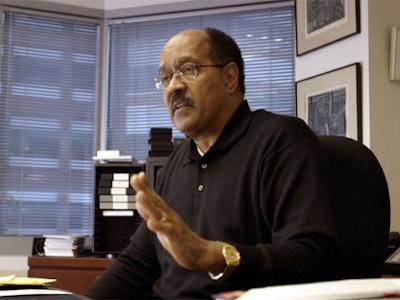 William “Bill” Gray, III was a former U.S. Rep and president of the United Negro College Fund
William “Bill” Gray, III was a former U.S. Rep and president of the United Negro College FundPHILADELPHIA — Many knew him as a powerful Black legislator who roamed the halls of Capitol Hill, but for thousands of Black students, he was their saving grace, barnstorming the country raising money to provide needed scholarships for students to attend college during his reign as president of the United Negro College Fund.
Reverend William “Bill” Herbert Gray III — the son of a prominent preacher and college president — died on Monday while in London with one of his sons attending the Wimbledon tennis championships. He was 71.
“This was a gifted man who used his gift to help a lot of other people, and he will be missed,” says Dr. W. Wilson Goode, who was elected Philadelphia’s first Black mayor in 1984. “He was a big man doing a big job, but he knew how to get stuff done.”
A native of Baton Rouge, La., Gray’s father was president of the school that would become Florida A&M University (1944-’49). The family later relocated to Philadelphia, where the younger Gray attended Simon Gratz High School.
In 1963, Gray received a bachelor’s degree from Franklin and Marshall College in Lancaster, Pa., where a merit-based scholarship for minority students currently bears his name.
He later attended Drew Theological Seminary in Madison, N.J., and succeeded his father as pastor of Philadelphia’s influential Bright Hope Baptist Church. In 1978, he was elected to Congress, but continued as senior pastor of Bright Hope, commuting between Philadelphia and Washington, D.C., on the weekends to deliver his weekly sermons.
“So many, many others — Black, White, Latino — across Philadelphia owe their political start, their communities’ start, to Bill Gray,” says Philadelphia Mayor Michael Nutter. “He created a political organization that, for decades, has continued to be one of the most powerful, productive and progressive forces in the social and political life of our city’s history.”
Gray’s political career is nothing short of phenomenal. He rose through the ranks in Congress to become chairman of the powerful budget committee and the first African-American majority whip of the U.S. House of Representatives. During his tenure, he authored legislation calling for economic sanctions against South Africa and was on hand when Nelson Mandela made his first visit in 1991 to the United States after he was released from prison.
During the height of racial tensions in the 1980s between Blacks and Jews, Gray and George M. Ross, a Goldman Sachs executive and philanthropist, created a cross-cultural program for Black and Jewish high school students in Philadelphia called Operation Understanding. Participants traveled to Israel and West Africa to learn about each other’s culture.
In 1991, Gray gave up his seat in Congress to become president of the United Negro College Fund, where he is credited with raising more than $2.3 billion for minority institutions. UNCF officials credit him with restructuring the staff and having a more active presence on the campuses of its member colleges. In addition, he developed the Frederick D. Patterson Research Institute to track and analyze data on issues affecting African-American students. He remained at UNCF until 2004.
“He was responsible for providing so many Black youngsters with an opportunity to pursue higher education,” says Jesse Epps, a labor and civil rights leader. “He understood very clearly that a good education was indeed the necessary tool that one needed in order to improve their lot in society.”
In 1994, President Bill Clinton appointed him as a special adviser on Haiti.
At the time of his death, Gray was retired and living in Florida, but was also chairman emeritus of Gray Global Advisors, a lobbying firm run by one of his sons.
He is survived by his wife, Andrea Dash, who he married in 1971, and the couple’s three sons: William H. Gray, Andrew and Justin.





















